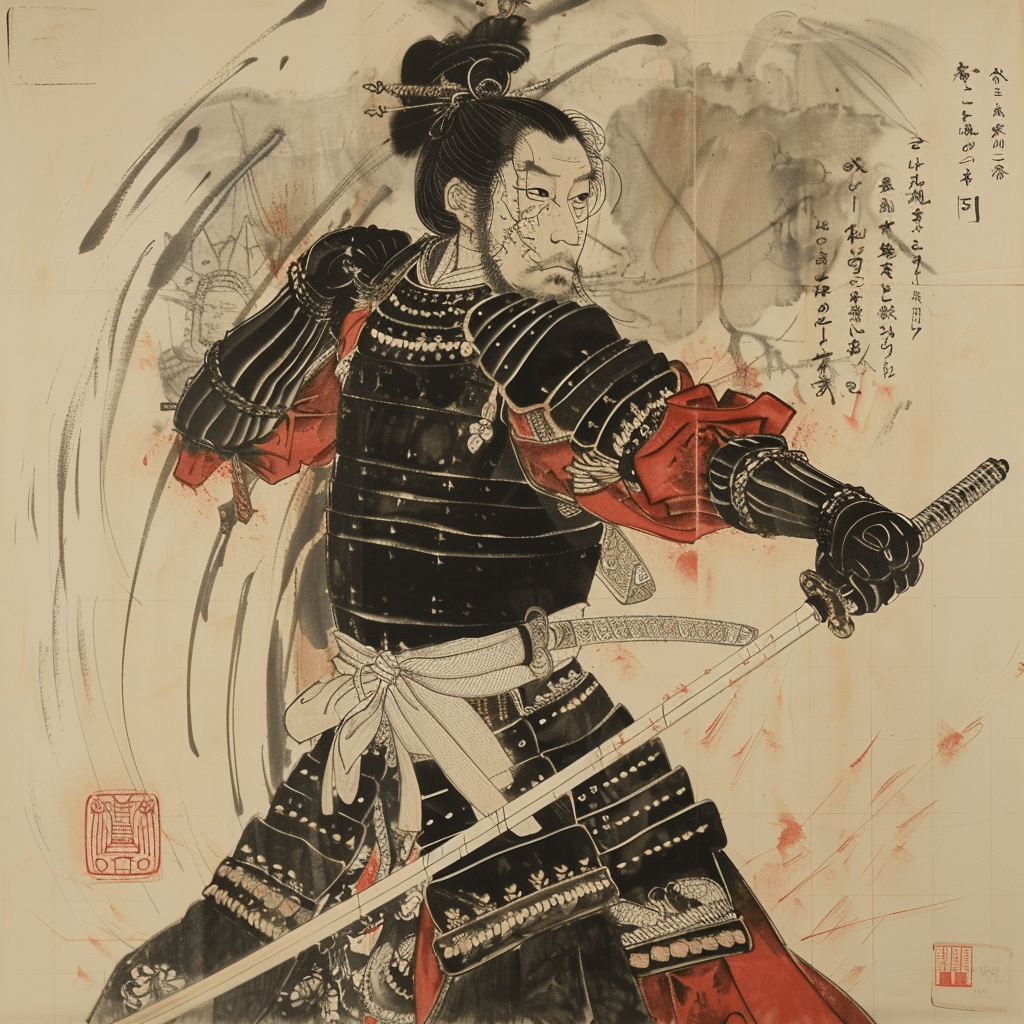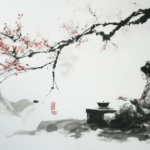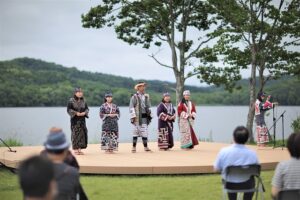The Sengoku period, a tumultuous era spanning from the mid-15th to the early 17th century, remains one of the most fascinating chapters in Japanese history. Characterized by relentless warfare, political intrigue, and the rise and fall of powerful daimyōs, this era laid the groundwork for the unification and modernization of Japan. Among the luminaries of this period, Mōri Motonari stands out not just as a formidable warlord but as a paragon of strategic genius and visionary leadership. His life and achievements offer a window into the complexities of feudal Japan, showcasing the blend of ruthless ambition and sophisticated governance that defined the age.
Motonari’s legacy is not merely the product of his military conquests but also his astute diplomacy, cultural patronage, and the profound influence he had on the development of the Chūgoku region. Through an exploration of his life, this blog post aims to dissect the layers of Motonari’s character, unraveling the strategies that enabled him to unify the Chūgoku region and cementing his status as a legendary figure in Japanese history. By delving into the narrative of Mōri Motonari, we uncover not only the story of a man who was ahead of his time but also the enduring lessons of leadership, unity, and strategic foresight that resonate well beyond the confines of feudal Japan.
II. Early Life and Ascension to Power
Mōri Motonari’s story begins in 1497, in the Aki Province of Japan, a time when the country was fragmented into competing feudal domains. Born into the prestigious Mōri clan, Motonari was initially not the first in line to inherit the leadership of the clan. His early years were marked by the turbulence of the Sengoku period, a time characterized by relentless warfare among the daimyōs, each vying for control over territories.
Family Lineage and Inheritance
Motonari was the second son of Mōri Hiromoto, a notable figure within the clan. Despite his secondary position, circumstances shifted in Motonari’s favor, propelling him into a leadership role following the untimely deaths of his elder brother and father. This sudden ascendancy placed a heavy burden on his shoulders, tasking him with the protection and expansion of his family’s domain amidst a period of chaos and fragmentation.
Initial Challenges
Assuming leadership at a young age, Motonari faced immediate challenges. His domain was surrounded by powerful and often hostile neighbors, all looking to capitalize on any sign of weakness. The early years of his rule were marked by defensive maneuvers, both military and diplomatic, as he sought to secure his position and the safety of his lands. These experiences honed Motonari’s skills in strategy and governance, laying the groundwork for his future successes.
Political Landscape of the Chūgoku Region
The Chūgoku region, where Motonari’s domain was located, was a strategically significant area that offered control over key trade routes and resources. It was also a region of intense rivalry among powerful clans, each with its own ambitions for expansion and dominance. In this competitive environment, Motonari’s initial goal was to consolidate his power within Aki Province before considering wider territorial expansion.
His early reign was characterized by careful diplomacy, strategic marriages, and the forging of alliances that would strengthen his position against external threats. Through these efforts, Motonari not only ensured the survival of his clan but also laid the foundation for its future prominence in the region.

Motonari’s ascension to power is a testament to his resilience, strategic insight, and leadership capabilities. From the precarious position of a young lord surrounded by enemies, he emerged as a formidable daimyō whose legacy would significantly shape the course of Japanese history. His early life and the challenges he overcame illustrate the making of a leader who would be remembered not just for his military achievements, but for his vision and governance that brought prosperity and unity to his domain.
III. Major Battles and Strategic Genius
Mōri Motonari’s reign is distinguished by several pivotal battles that not only demonstrated his military acumen but also significantly expanded his domain and influence. His strategic genius, characterized by innovative tactics and a deep understanding of both his allies and adversaries, played a crucial role in these engagements. Below are key battles that underscore Motonari’s military prowess.
The Battle of Miyajima (1555)
One of Motonari’s most famous engagements, the Battle of Miyajima, showcases his cunning and strategic depth. The battle was against the rival Sue clan, which had previously seized the Itsukushima Shrine, a strategic and symbolic location. Motonari’s response was a masterclass in deception and strategy.
Motonari feigned defeat in an initial skirmish, luring the Sue forces into a false sense of security. He then launched a surprise night attack, exploiting the tide cycles to cross over to the island of Miyajima. This attack caught the Sue forces off guard, leading to a decisive victory for Motonari. The battle not only exemplified his understanding of psychological warfare but also his ability to use the natural environment to his advantage.
The Siege of Koriyama (1540-1541)
The Siege of Koriyama against the Amago clan was another significant conflict that tested Motonari’s strategic abilities. This battle was crucial for control over the Chūgoku region. Motonari managed to lay siege to Koriyama Castle, the stronghold of the Amago clan, implementing a prolonged strategy that eventually led to his victory.
Motonari’s approach to the siege demonstrated his patience and tactical foresight. Instead of a direct and potentially costly assault, he chose to cut off supplies to the castle, weakening the enemy over time. This strategy not only conserved his forces but also sapped the morale of the defenders, leading to their eventual surrender.
Use of Alliances, Espionage, and Psychological Warfare
Motonari’s strategic genius was not limited to the battlefield. He was also a master of diplomacy, alliances, and espionage. He skillfully navigated the complex web of Sengoku period politics, forming alliances that expanded his influence and gathering intelligence that informed his military strategies. His ability to anticipate the moves of his enemies and allies alike gave him a significant advantage in both military and diplomatic arenas.
Motonari’s use of psychological warfare was another aspect of his strategic genius. By spreading misinformation, leveraging alliances to create distrust among his enemies, and employing tactics that demoralized opposing forces, he often won battles before they even began.
Strategic Foresight in the Battle of Itsukushima
The Battle of Itsukushima, beyond its immediate tactical brilliance, also demonstrated Motonari’s long-term strategic foresight. By securing the Itsukushima Shrine, Motonari not only gained a strategic asset but also enhanced his clan’s prestige. This victory was a turning point, solidifying his control over the Chūgoku region and discouraging further attempts by rivals to challenge his dominance.
Mōri Motonari’s military campaigns were characterized by a blend of brute force, strategic cunning, and psychological manipulation. His victories in major battles were not merely the result of military might but of a superior understanding of warfare, both in terms of tactics and the human psyche. Through these engagements, Motonari not only expanded his territory but also laid the groundwork for the future prosperity and dominance of the Mōri clan in the Sengoku period.
IV. Diplomacy and Expansion
Mōri Motonari’s legacy is not solely built on his prowess in battle but equally on his diplomatic sagacity and strategic expansionism. His era was marked by constant conflict and shifting alliances, yet Motonari excelled not only as a military strategist but also as a diplomat, weaving a complex network of alliances that expanded his influence far beyond the battlefield. This segment explores how his diplomatic efforts and strategic vision facilitated the expansion of the Mōri domain.
Masterful Use of Diplomacy
Motonari’s diplomatic strategies were as nuanced as his military tactics. Recognizing the limitations of military action in achieving long-term peace and stability, he sought to secure his clan’s position through strategic marriages, alliances, and sometimes, acts of reconciliation with former foes. These alliances were not merely opportunistic but were carefully chosen to ensure they aligned with the long-term interests and security of the Mōri clan.
One of the key aspects of Motonari’s diplomacy was his ability to maintain a balance of power within the Chūgoku region. He skillfully navigated the complex political landscape, forging alliances with other powerful families and strategically marrying his children into influential clans. This not only secured the Mōri clan’s position but also expanded its influence through kinship ties.
Expansion Through Strategic Alliances
Motonari’s expansionist policy was significantly bolstered through his adept use of strategic alliances. These alliances were instrumental in his campaign to unify the Chūgoku region under Mōri control. By aligning with certain clans at opportune moments, Motonari was able to isolate and weaken his adversaries, paving the way for territorial expansion without significant military engagement.
His alliances extended beyond immediate military objectives, serving also to establish a durable peace that facilitated trade and prosperity within his domain. By securing the loyalty and cooperation of neighboring lords, Motonari ensured that his expansion efforts were not constantly undermined by rebellion or dissent.
Economic Growth and Trade
Under Motonari’s leadership, the Mōri domain witnessed significant economic growth and became a thriving center of trade. Recognizing the importance of economic stability and prosperity in maintaining power, Motonari implemented policies that encouraged trade, agriculture, and artisanal crafts.
The strategic control of key ports and trade routes allowed the Mōri clan to accumulate wealth and resources, further cementing their power and influence in the region. This economic prowess provided Motonari with the financial stability required to support his military campaigns and governance initiatives.
The Succession Plan and Mōri Dominance
Understanding the importance of a stable succession, Motonari took great care in planning the future leadership of the Mōri clan. He groomed his sons and grandsons for leadership, instilling in them the values of wisdom, strategic thinking, and the importance of maintaining the clan’s unity and prosperity.
Through his careful planning and the establishment of a capable succession, Motonari ensured that the Mōri clan would not only maintain but also expand its influence after his death. The succession plan was a testament to his foresight, ensuring that his legacy would endure through subsequent generations.
Mōri Motonari’s approach to diplomacy and expansion was characterized by a keen understanding of the broader geopolitical landscape and a strategic vision that extended beyond mere military conquests. His efforts in securing alliances, promoting economic prosperity, and planning for a stable succession laid the foundation for the Mōri clan’s dominance in the Sengoku period and beyond. His legacy as a unifier and a visionary leader is a reflection of his achievements in both diplomacy and strategic expansion.
V. Governance and Cultural Contributions
Mōri Motonari’s impact on Japan extends beyond his military and diplomatic successes; his governance and cultural contributions significantly shaped the Chūgoku region and left a lasting legacy on Japanese society. This segment delves into Motonari’s administrative policies, cultural patronage, and the broader implications of his leadership on the socio-economic development of his domain.
Administrative Policies and Reforms
Motonari was a visionary leader who understood the importance of effective governance in ensuring the prosperity and stability of his domain. His administrative policies were designed to strengthen the economic base of the region, promote social stability, and enhance the welfare of his subjects. He implemented land reforms that improved agricultural productivity and also reorganized the tax system to be more equitable, thereby increasing revenue without overburdening the peasantry.
Motonari placed great emphasis on law and order, establishing a legal code that applied uniformly to his territories. This not only facilitated more effective governance but also promoted a sense of justice and fairness among his subjects, consolidating their loyalty and support.
Contributions to Culture, Arts, and Education
Motonari was not only a skilled warrior and leader but also a patron of the arts and culture. He recognized the importance of cultural development as a means of enhancing the prestige of his clan and enriching the lives of his people. Motonari supported various cultural activities, including the tea ceremony, Noh theater, and traditional Japanese poetry (waka). His patronage of these arts helped to cultivate a refined and sophisticated culture within his domain, which attracted artists, poets, and scholars, thereby fostering an environment of intellectual and artistic flourish.
His contributions to education were equally significant. Motonari established schools and supported scholarly endeavors, promoting literacy and learning among the samurai class and, to some extent, the common people. This emphasis on education not only prepared his heirs and the samurai for leadership and governance but also contributed to the cultural and intellectual vibrancy of his domain.
The Legacy of Governance and Cultural Flourishing
The governance and cultural policies implemented by Motonari had a profound impact on the Chūgoku region, leading to a period of economic prosperity, social stability, and cultural richness. His efforts to promote fairness in administration, coupled with his support for the arts and education, helped to elevate the status of the Mōri domain as a center of culture and governance in Sengoku Japan.
Moreover, Motonari’s legacy in governance and culture set a precedent for future daimyōs, illustrating the importance of balanced leadership that values both martial prowess and cultural sophistication. His contributions to the arts and his support for education continue to be celebrated, highlighting his role as a patron of culture and a leader who recognized the value of intellectual and artistic pursuits.
VI. The Three Arrows: Legacy of Unity
Among the most enduring legacies of Mōri Motonari is the tale of the Three Arrows, a powerful symbol of unity and strength that transcends its historical origins to offer timeless lessons in leadership and cooperation. This allegory not only encapsulates Motonari’s philosophy but also serves as an emblematic representation of his approach to leadership and governance.
The Tale of the Three Arrows
The story goes that in his later years, Motonari gathered his three sons and presented them each with an arrow. He asked them to break the arrows individually, which they did with ease. However, when he bundled three arrows together and asked his sons to break them, they found the task impossible. Through this demonstration, Motonari imparted a profound lesson: while one arrow could be easily broken, three arrows bundled together represented strength in unity. This simple yet powerful metaphor was intended to teach his sons the importance of standing together and supporting one another in the face of adversity.
Symbolism in Japanese Culture
The tale of the Three Arrows has transcended its historical context to become a widely recognized symbol in Japanese culture, representing the strength found in unity. It underscores the idea that while individuals may be vulnerable on their own, together they can withstand significant challenges. This concept of collective strength has resonated through Japanese history and culture, influencing various aspects of society, including family values, business practices, and even sports teams.
Impact on the Mōri Clan’s Unity and Strength
For the Mōri clan, the lesson of the Three Arrows was more than just a moral story; it was a guiding principle that shaped their internal cohesion and strategic alliances. Under Motonari’s leadership, the clan exemplified the strength in unity, with members and allies working closely to achieve common goals. This unity was instrumental in the clan’s successful navigation of the tumultuous Sengoku period, allowing them to emerge as one of the most powerful and influential forces in Japan.
Enduring Impact on Leadership and Teamwork
The legacy of the Three Arrows extends beyond its historical origins, offering valuable insights into leadership and teamwork in contemporary contexts. The principle of unity and collective strength is applicable in various modern settings, from corporate teams to community organizations. It emphasizes the importance of cooperation, mutual support, and the collective pursuit of objectives, principles that are as relevant today as they were in Motonari’s time.
Conclusion
Mōri Motonari’s tale of the Three Arrows serves as a lasting testament to his wisdom and leadership philosophy. It encapsulates the essence of his approach to governance, diplomacy, and familial relations, emphasizing the power of unity and cooperation. This legacy of unity, symbolized through the simple yet profound allegory of the Three Arrows, continues to inspire and guide individuals and groups, reminding us of the strength that lies in standing together. Through this enduring legacy, Motonari’s influence extends far beyond the confines of his historical period, offering timeless lessons on the importance of unity and collective resilience.





